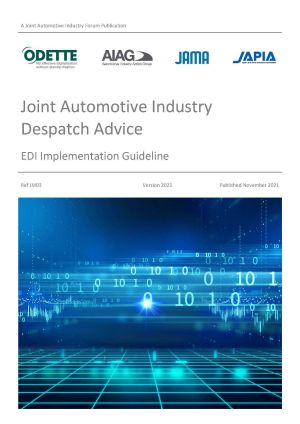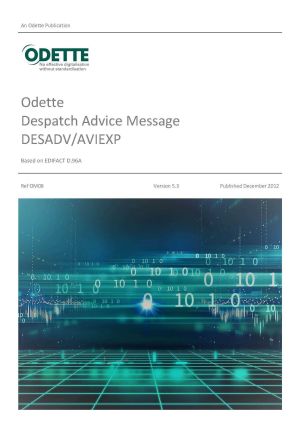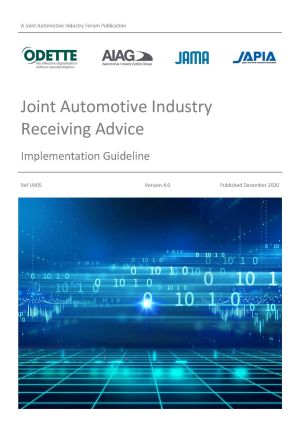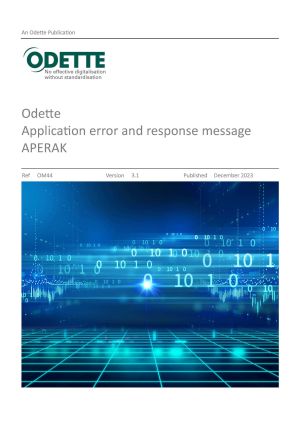Delivery
Despatch & Receive


About
Information about deliveries is some of the most important information exchanged between supply chain partners in an industry which operates on JIT and JIS principles, facilitated by standardised digital messages.
The Despatch Advice message (DESADV) aka Advance Shipping Notification (ASN) gives customers confidence that parts required for production will arrive on time, allows them to prepare for their reception and facilitates the automation of their goods receiving process.
It can also be sent to the service provider involved in the transportation of the parts to assist their operations, especially where any cross-dock activity is involved.
On the supplier side, the Despatch Advice message can serve as a basis for the subsequent invoicing process ensuring automatic matching and eliminating delays in payment.
If any discrepancies between advised and actually received deliveries do appear, these can be reported using the Receiving Advice message (RECADV), allowing the supplier to take immediate corrective action to avoid disruptions to production on the customer side.
Delivery is undoubtedly the area with the most potential to bring further efficiencies to the overall logistics process and Odette works closely with member companies to ensure that the associated standard digital messages can support the process improvements required by the industry.
-
news
Preparing for eFTI
27 Jun 2024
The electronic Freight Transport Information (eFTI) Regulation is a significant contributor to the tsunami of regulations currently hitting or approaching the automotive supply chain. It is essential that automotive processes are taken into account in the implementation of the regulation in order to minimise disruption and avoid additional cost. Odette is on hand to ensure that the regulation can be implemented as smoothly as possible by our member companies.
-

news
Odette brings industry together to meet packaging challenges
29 Sep 2023
At the request of its members, Odette has called a meeting of automotive companies and packaging manufacturers on 22 November in Berlin to discuss the current challenges facing the suppliers and users of automotive packaging, and the possibility of taking a collaborative approach to meet those challenges.
-

news
Smart EV company NIO introduces MMOG with suppliers
14 Sep 2023
NIO, a pioneer and a leading company in the premium smart electric vehicle market that designs and builds electric vehicles, has announced that it started to adopt the Supply Chain Management assessment tool developed by Odette and AIAG.
Resources

Joint Automotive Despatch Advice Message
EDI Implementation Guideline
DESADV
Based on EDIFACT D.20B
(File must be opened with Adobe Acrobat to access attachments)

Odette Despatch Advice Message
EDI Implementation Guideline
AVIEXP
Based on EDIFACT DESADV D.96A - Syntax v4

Joint Automotive Receiving Advice Message
EDI Implementation Guideline
RECADV
Based on EDIFACT D.07A - Syntax v4
(File must be opened with Adobe Acrobat to access attachments)

Managing Inbound Transport with Mobile Apps
The recommendation describes a standard model for the exchange of data between the yard management systems of the plants and the transport management system of the transport service providers. Based on this recommendation, application developers will be able to develop and programme the various IT systems in such a way that the requirements for the operational control of transport in the arrival area are supported uniformly across all apps.

Suppliers Long Term Declaration Message
XML Implementation Guideline
Specifies a data exchange procedure and structured format for the transmission of supplier declarations to customers concerning the origin of the parts they are supplying The declaration in the form of an XML message can be processed automatically in the customer system.
Includes XML Guideline, XML Schema file and associated technical artefacts and business rules for the use of the XML Suppliers Long Term Declaration as well as examples visualised as forms.

Odette Application Error and Acknowledgement
EDI Implementation Guideline
APERAK
Based on EDIFACT APERAK D.08A - Syntax v4
This message supports automated error handling for incoming EDI messages such as Despatch Advice or Invoice, including:
- Acknowledgement of receipt of the incoming message
- Reporting of syntax errors which prevent further processing.
- Reporting of actual data errors